
redis-ai-resources
✨ A curated list of awesome community resources, integrations, and examples of Redis in the AI ecosystem.
Stars: 170
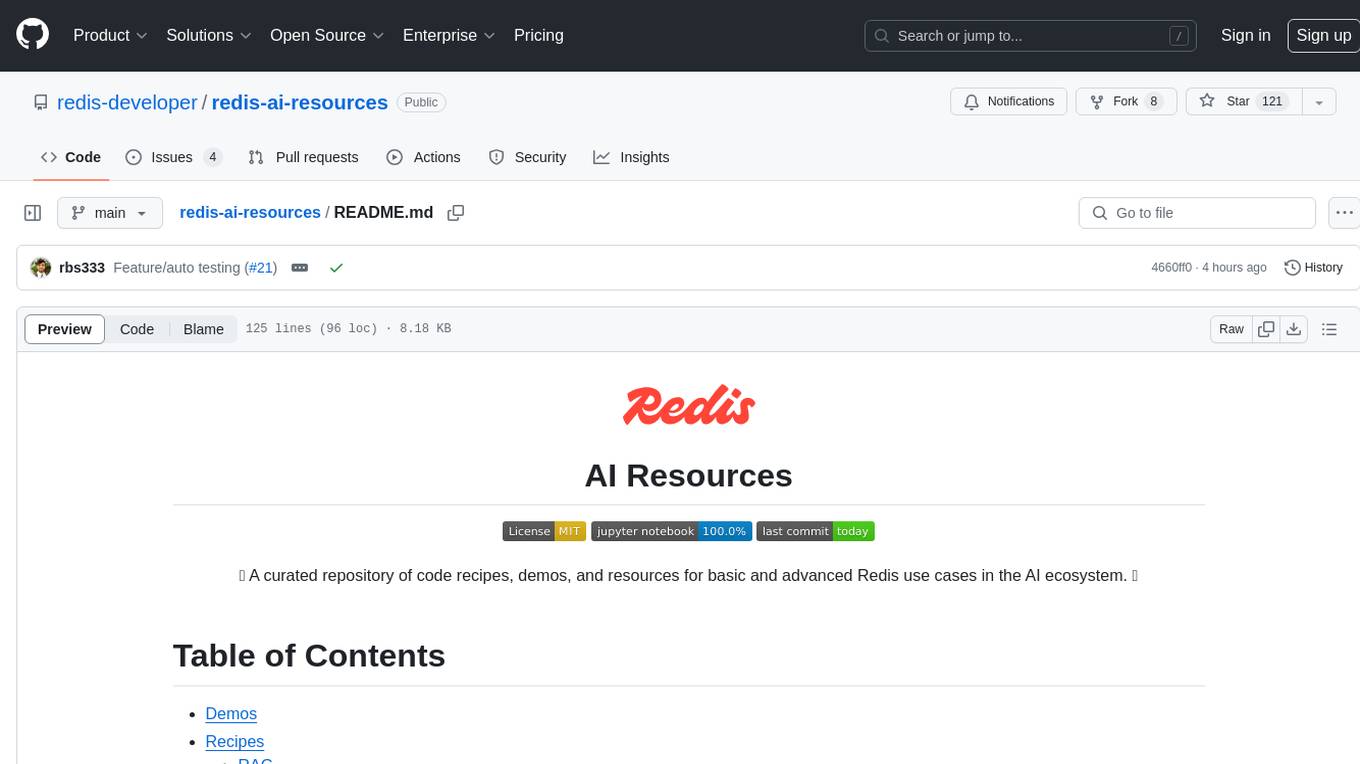
A curated repository of code recipes, demos, and resources for basic and advanced Redis use cases in the AI ecosystem. It includes demos for ArxivChatGuru, Redis VSS, Vertex AI & Redis, Agentic RAG, ArXiv Search, and Product Search. Recipes cover topics like Getting started with RAG, Semantic Cache, Advanced RAG, and Recommendation systems. The repository also provides integrations/tools like RedisVL, AWS Bedrock, LangChain Python, LangChain JS, LlamaIndex, Semantic Kernel, RelevanceAI, and DocArray. Additional content includes blog posts, talks, reviews, and documentation related to Vector Similarity Search, AI-Powered Document Search, Vector Databases, Real-Time Product Recommendations, and more. Benchmarks compare Redis against other Vector Databases and ANN benchmarks. Documentation includes QuickStart guides, official literature for Vector Similarity Search, Redis-py client library docs, Redis Stack documentation, and Redis client list.
README:
Demos | Recipes | Tutorials | Integrations | Content | Benchmarks | Docs
No faster way to get started than by diving in and playing around with a demo.
| Demo | Description |
|---|---|
| Redis RAG Workbench | Interactive demo to build a RAG-based chatbot over a user-uploaded PDF. Toggle different settings and configurations to improve chatbot performance and quality. Utilizes RedisVL, LangChain, RAGAs, and more. |
| Redis VSS - Simple Streamlit Demo | Streamlit demo of Redis Vector Search |
| ArXiv Search | Full stack implementation of Redis with React FE |
| Product Search | Vector search with Redis Stack and Redis Enterprise |
| ArxivChatGuru | Streamlit demo of RAG over Arxiv documents with Redis & OpenAI |
Need quickstarts to begin your Redis AI journey? Start here.
| Recipe | Description |
|---|---|
| /redis-intro/00_redis_intro.ipynb | The place to start if brand new to Redis |
| /vector-search/00_redispy.ipynb | Vector search with Redis python client |
| /vector-search/01_redisvl.ipynb | Vector search with Redis Vector Library |
| /vector-search/02_hybrid_search.ipynb | Hybrid search techniques with Redis (BM25 + Vector) |
| /vector-search/03_float16_support.ipynb | Shows how to convert a float32 index to use float16 |
Retrieval Augmented Generation (aka RAG) is a technique to enhance the ability of an LLM to respond to user queries. The retrieval part of RAG is supported by a vector database, which can return semantically relevant results to a user’s query, serving as contextual information to augment the generative capabilities of an LLM.
To get started with RAG, either from scratch or using a popular framework like Llamaindex or LangChain, go with these recipes:
| Recipe | Description |
|---|---|
| /RAG/01_redisvl.ipynb | RAG from scratch with the Redis Vector Library |
| /RAG/02_langchain.ipynb | RAG using Redis and LangChain |
| /RAG/03_llamaindex.ipynb | RAG using Redis and LlamaIndex |
| /RAG/04_advanced_redisvl.ipynb | Advanced RAG techniques |
| /RAG/05_nvidia_ai_rag_redis.ipynb | RAG using Redis and Nvidia NIMs |
| /RAG/06_ragas_evaluation.ipynb | Utilize the RAGAS framework to evaluate RAG performance |
| /RAG/07_user_role_based_rag.ipynb | Implement a simple RBAC policy with vector search using Redis |
LLMs are stateless. To maintain context within a conversation chat sessions must be stored and resent to the LLM. Redis manages the storage and retrieval of chat sessions to maintain context and conversational relevance.
| Recipe | Description |
|---|---|
| /llm-session-manager/00_session_manager.ipynb | LLM session manager with semantic similarity |
| /llm-session-manager/01_multiple_sessions.ipynb | Handle multiple simultaneous chats with one instance |
An estimated 31% of LLM queries are potentially redundant (source). Redis enables semantic caching to help cut down on LLM costs quickly.
| Recipe | Description |
|---|---|
| /semantic-cache/doc2cache_llama3_1.ipynb | Build a semantic cache using the Doc2Cache framework and Llama3.1 |
| /semantic-cache/semantic_caching_gemini.ipynb | Build a semantic cache with Redis and Google Gemini |
Routing is a simple and effective way of preventing misuses with your AI application or for creating branching logic between data sources etc.
| Recipe | Description |
|---|---|
| /semantic-router/00_semantic_routing.ipynb | Simple examples of how to build an allow/block list router in addition to a multi-topic router |
| Recipe | Description |
|---|---|
| /agents/00_langgraph_redis_agentic_rag.ipynb | Notebook to get started with lang-graph and agents |
| /agents/01_crewai_langgraph_redis.ipynb | Notebook to get started with lang-graph and agents |
| /agents/02_full_featured_agent.ipynb | Notebook builds full tool calling agent with semantic cache and router |
| Recipe | Description |
|---|---|
| /computer-vision/00_facial_recognition_facenet.ipynb | Build a facial recognition system using the Facenet embedding model and RedisVL. |
| Recipe | Description |
|---|---|
| /recommendation-systems/00_content_filtering.ipynb | Intro content filtering example with redisvl |
| /recommendation-systems/01_collaborative_filtering.ipynb | Intro collaborative filtering example with redisvl |
| Recipe | Description |
|---|---|
| /feature-store/00_feast_credit_score.ipynb | Credit scoring system using Feast with Redis as the online store. |
Need a deeper-dive through different use cases and topics?
| Tutorial | Description |
|---|---|
| Agentic RAG | A tutorial focused on agentic RAG with LlamaIndex and Cohere |
| RAG on VertexAI | A RAG tutorial featuring Redis with Vertex AI |
| Recommendation Systems w/ NVIDIA Merlin & Redis | Three examples, each escalating in complexity, showcasing the process of building a realtime recsys with NVIDIA and Redis |
Redis integrates with many different players in the AI ecosystem. Here's a curated list below:
| Integration | Description |
|---|---|
| RedisVL | A dedicated Python client lib for Redis as a Vector DB |
| AWS Bedrock | Streamlines GenAI deployment by offering foundational models as a unified API |
| LangChain Python | Popular Python client lib for building LLM applications powered by Redis |
| LangChain JS | Popular JS client lib for building LLM applications powered by Redis |
| LlamaIndex | LlamaIndex Integration for Redis as a vector Database (formerly GPT-index) |
| LiteLLM | Popular LLM proxy layer to help manage and streamline usage of multiple foundation models |
| Semantic Kernel | Popular lib by MSFT to integrate LLMs with plugins |
| RelevanceAI | Platform to tag, search and analyze unstructured data faster, built on Redis |
| DocArray | DocArray Integration of Redis as a VectorDB by Jina AI |
- Vector Databases and Large Language Models - Talk given at LLMs in Production Part 1 by Sam Partee.
- Level-up RAG with RedisVL
- Improving RAG quality with RAGAs
- Vector Databases and AI-powered Search Talk - Video "Vector Databases and AI-powered Search" given by Sam Partee at SDSC 2023.
- NVIDIA RecSys with Redis
- Benchmarking results for vector databases - Benchmarking results for vector databases, including Redis and 7 other Vector Database players.
- Redis Vector Library Docs
- Redis Vector Search API Docs - Official Redis literature for Vector Similarity Search.
For Tasks:
Click tags to check more tools for each tasksFor Jobs:
Alternative AI tools for redis-ai-resources
Similar Open Source Tools

redis-ai-resources
A curated repository of code recipes, demos, and resources for basic and advanced Redis use cases in the AI ecosystem. It includes demos for ArxivChatGuru, Redis VSS, Vertex AI & Redis, Agentic RAG, ArXiv Search, and Product Search. Recipes cover topics like Getting started with RAG, Semantic Cache, Advanced RAG, and Recommendation systems. The repository also provides integrations/tools like RedisVL, AWS Bedrock, LangChain Python, LangChain JS, LlamaIndex, Semantic Kernel, RelevanceAI, and DocArray. Additional content includes blog posts, talks, reviews, and documentation related to Vector Similarity Search, AI-Powered Document Search, Vector Databases, Real-Time Product Recommendations, and more. Benchmarks compare Redis against other Vector Databases and ANN benchmarks. Documentation includes QuickStart guides, official literature for Vector Similarity Search, Redis-py client library docs, Redis Stack documentation, and Redis client list.
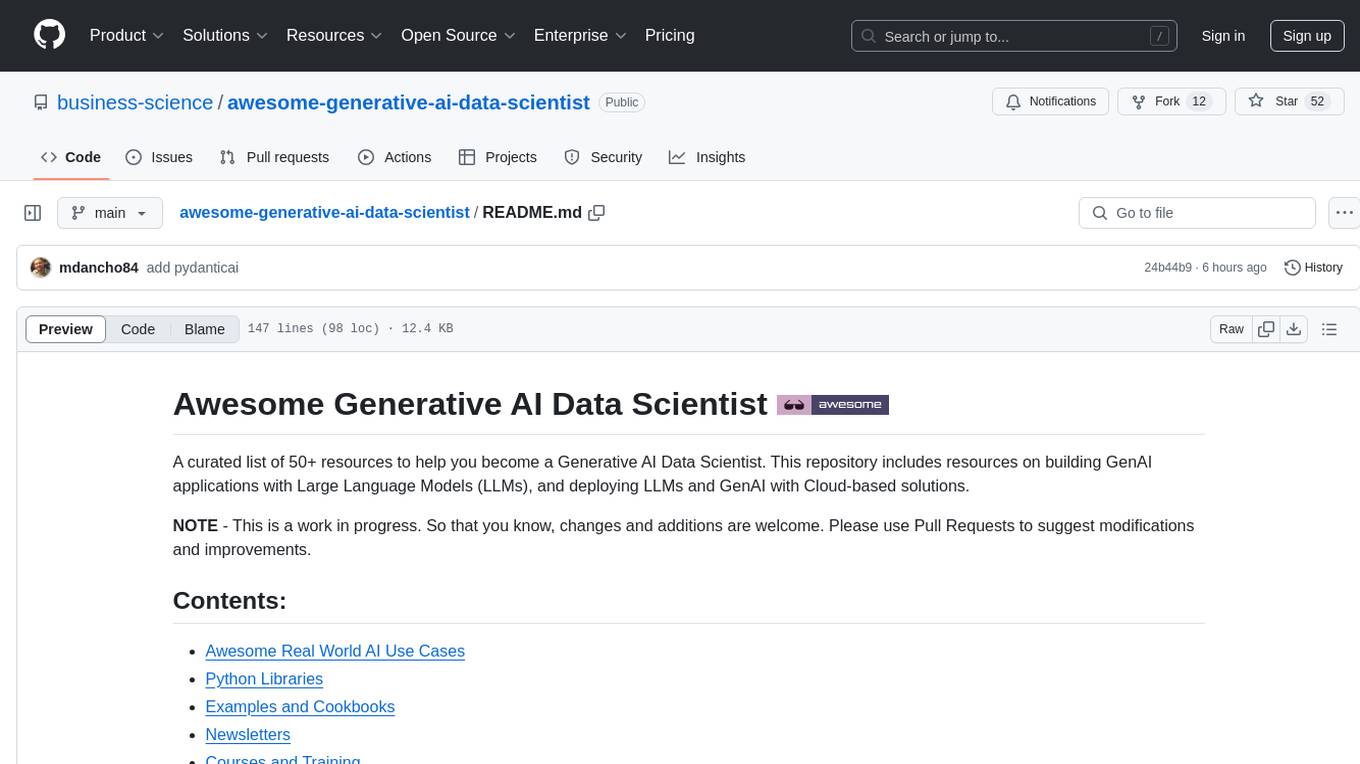
awesome-generative-ai-data-scientist
A curated list of 50+ resources to help you become a Generative AI Data Scientist. This repository includes resources on building GenAI applications with Large Language Models (LLMs), and deploying LLMs and GenAI with Cloud-based solutions.
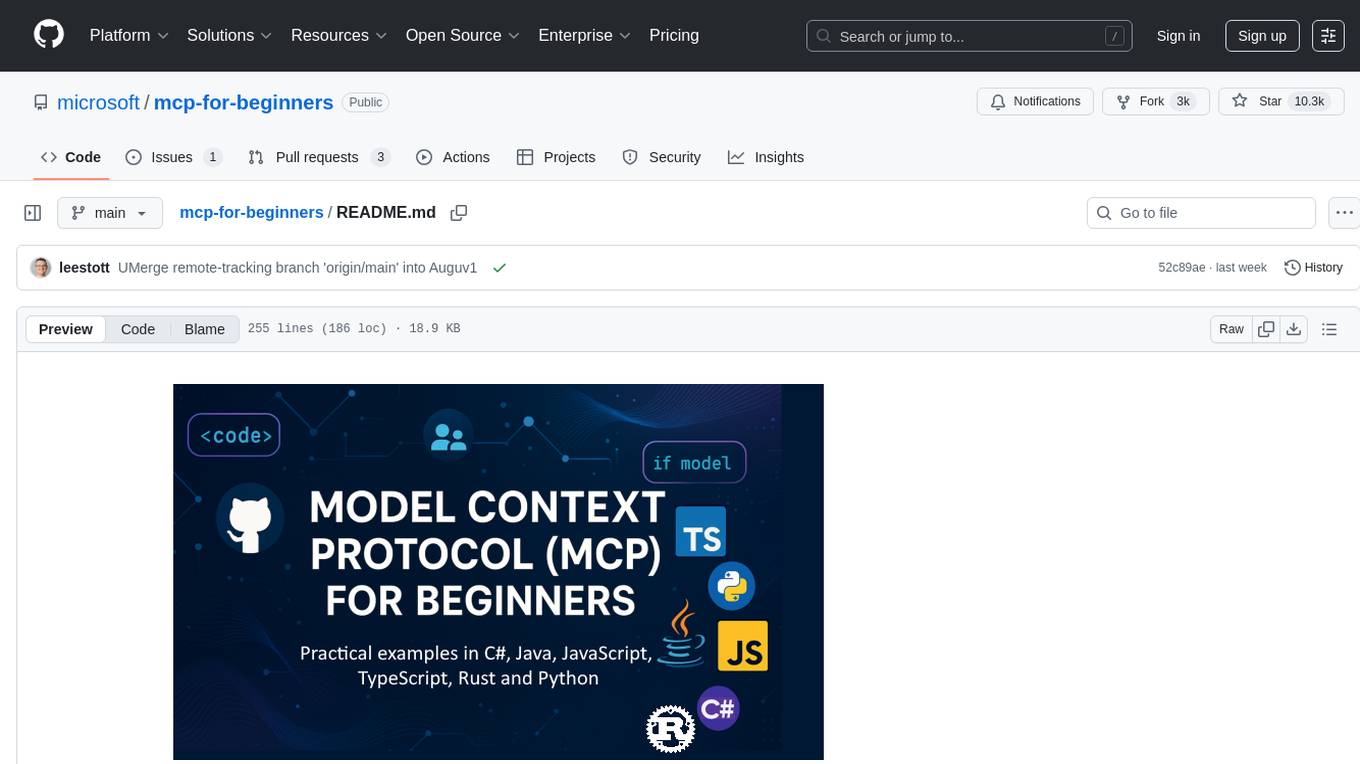
mcp-for-beginners
The Model Context Protocol (MCP) Curriculum for Beginners is an open-source framework designed to standardize interactions between AI models and client applications. It offers a structured learning path with practical coding examples and real-world use cases in popular programming languages like C#, Java, JavaScript, Rust, Python, and TypeScript. Whether you're an AI developer, system architect, or software engineer, this guide provides comprehensive resources for mastering MCP fundamentals and implementation strategies.
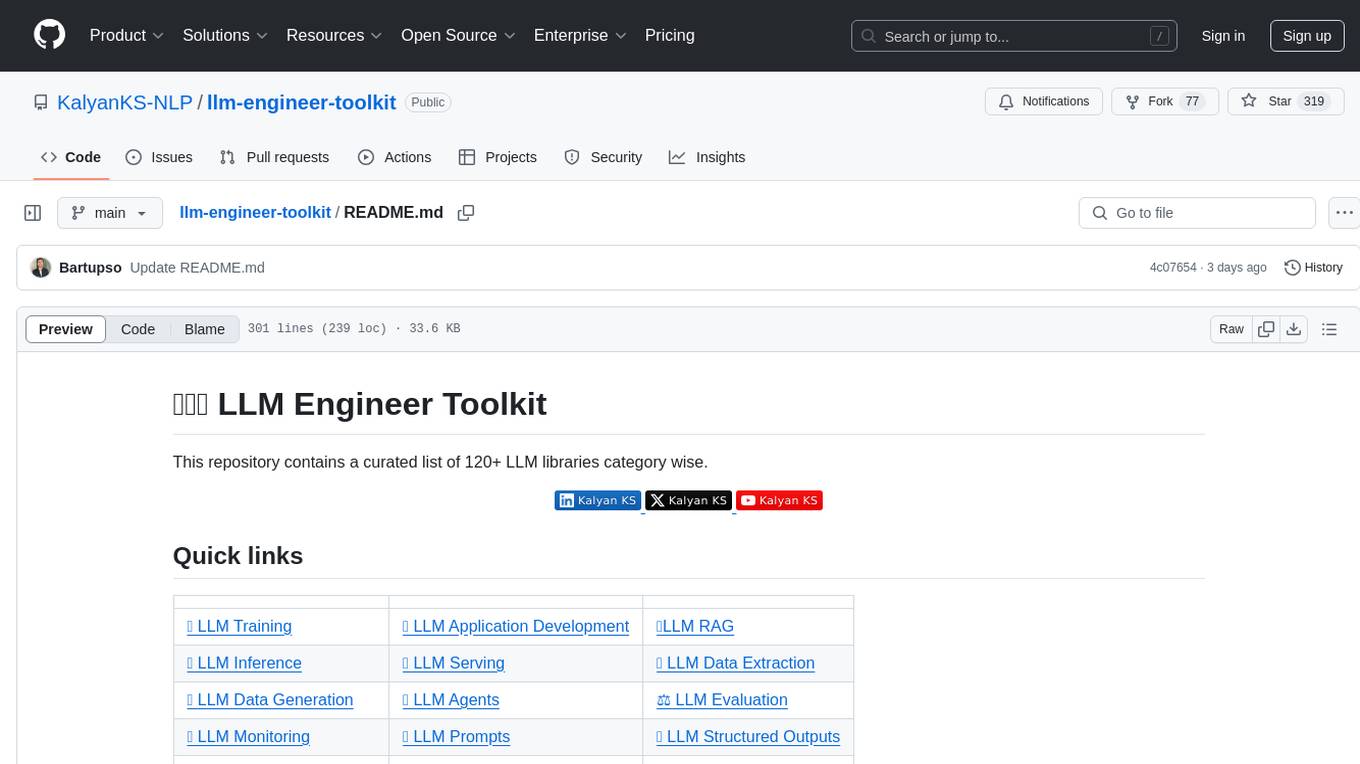
llm-engineer-toolkit
The LLM Engineer Toolkit is a curated repository containing over 120 LLM libraries categorized for various tasks such as training, application development, inference, serving, data extraction, data generation, agents, evaluation, monitoring, prompts, structured outputs, safety, security, embedding models, and other miscellaneous tools. It includes libraries for fine-tuning LLMs, building applications powered by LLMs, serving LLM models, extracting data, generating synthetic data, creating AI agents, evaluating LLM applications, monitoring LLM performance, optimizing prompts, handling structured outputs, ensuring safety and security, embedding models, and more. The toolkit covers a wide range of tools and frameworks to streamline the development, deployment, and optimization of large language models.
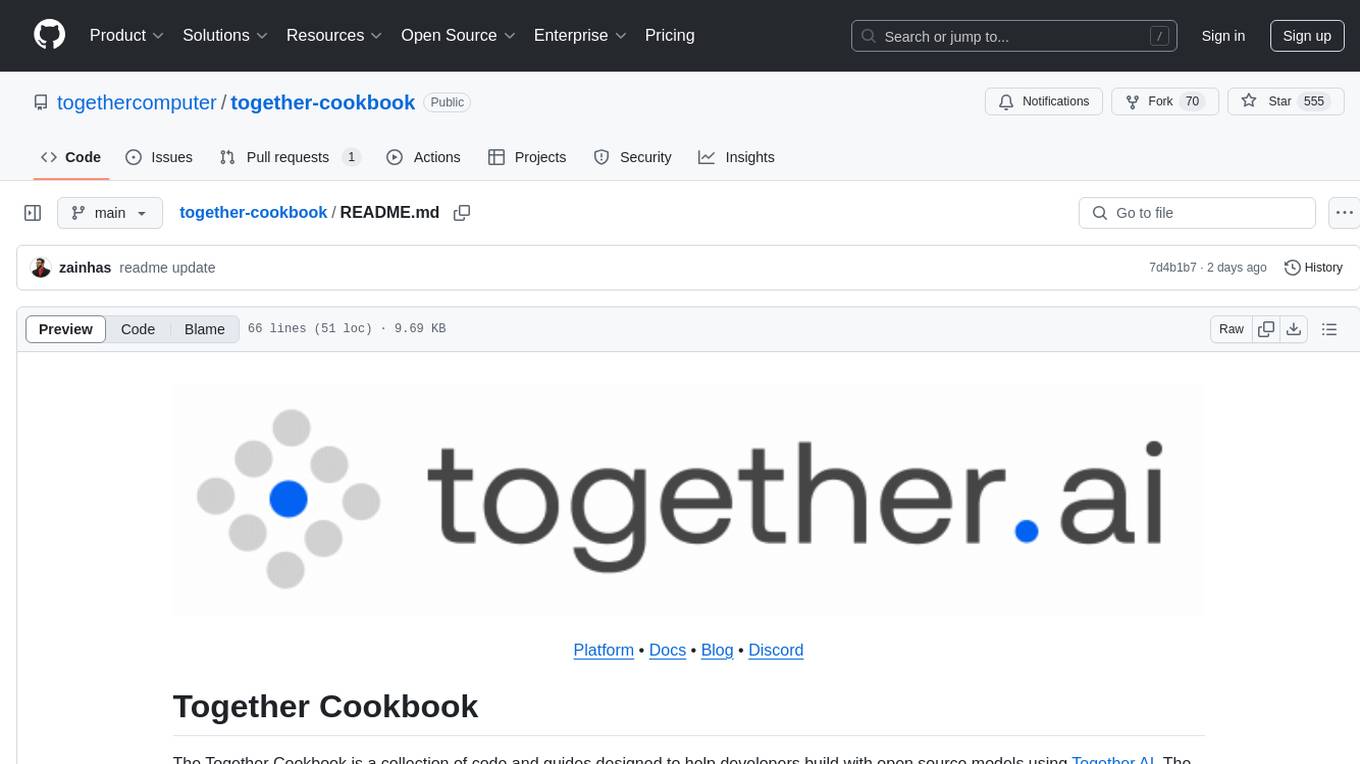
together-cookbook
The Together Cookbook is a collection of code and guides designed to help developers build with open source models using Together AI. The recipes provide examples on how to chain multiple LLM calls, create agents that route tasks to specialized models, run multiple LLMs in parallel, break down tasks into parallel subtasks, build agents that iteratively improve responses, perform LoRA fine-tuning and inference, fine-tune LLMs for repetition, improve summarization capabilities, fine-tune LLMs on multi-step conversations, implement retrieval-augmented generation, conduct multimodal search and conditional image generation, visualize vector embeddings, improve search results with rerankers, implement vector search with embedding models, extract structured text from images, summarize and evaluate outputs with LLMs, generate podcasts from PDF content, and get LLMs to generate knowledge graphs.
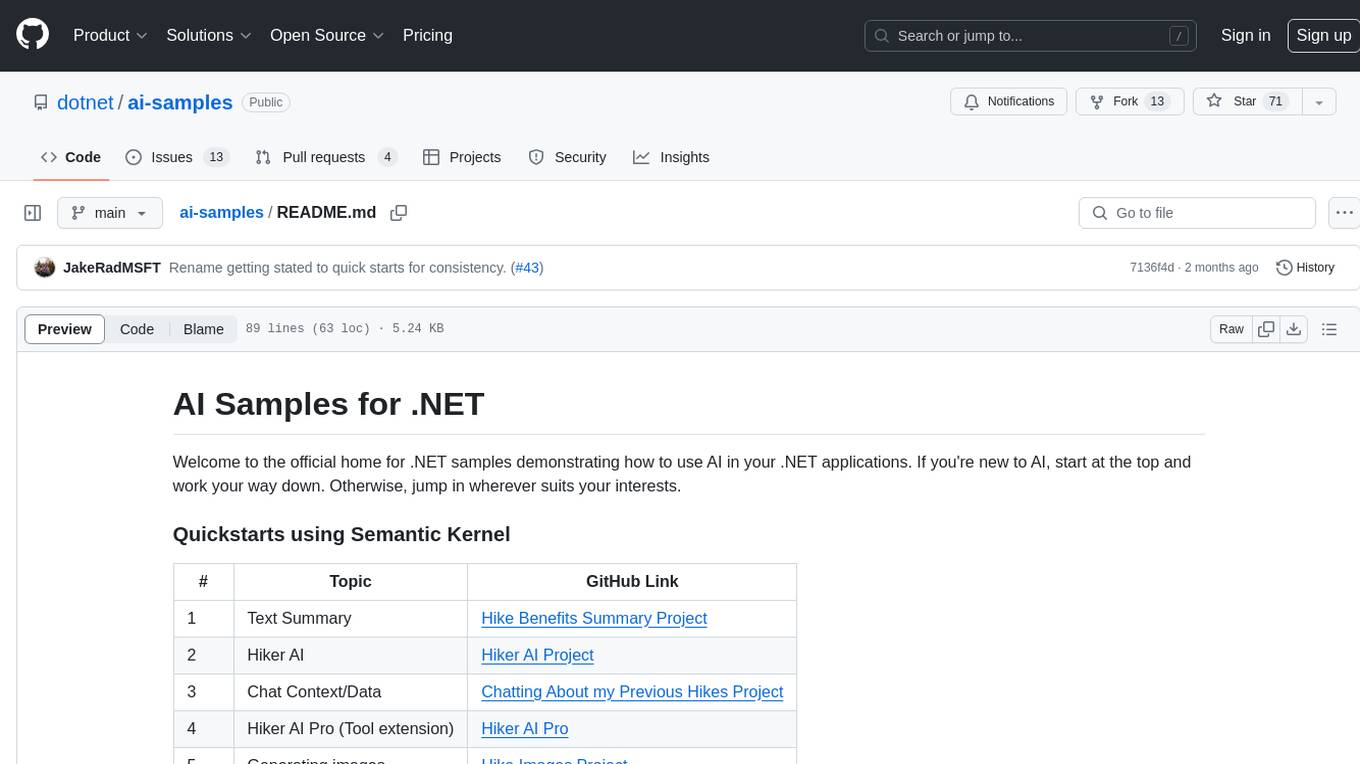
ai-samples
AI Samples for .NET is a repository containing various samples demonstrating how to use AI in .NET applications. It provides quickstarts using Semantic Kernel and Azure OpenAI SDK, covers LLM Core Concepts, End to End Examples, Local Models, Local Embedding Models, Tokenizers, Vector Databases, and Reference Examples. The repository showcases different AI-related projects and tools for developers to explore and learn from.

LLM-PowerHouse-A-Curated-Guide-for-Large-Language-Models-with-Custom-Training-and-Inferencing
LLM-PowerHouse is a comprehensive and curated guide designed to empower developers, researchers, and enthusiasts to harness the true capabilities of Large Language Models (LLMs) and build intelligent applications that push the boundaries of natural language understanding. This GitHub repository provides in-depth articles, codebase mastery, LLM PlayLab, and resources for cost analysis and network visualization. It covers various aspects of LLMs, including NLP, models, training, evaluation metrics, open LLMs, and more. The repository also includes a collection of code examples and tutorials to help users build and deploy LLM-based applications.
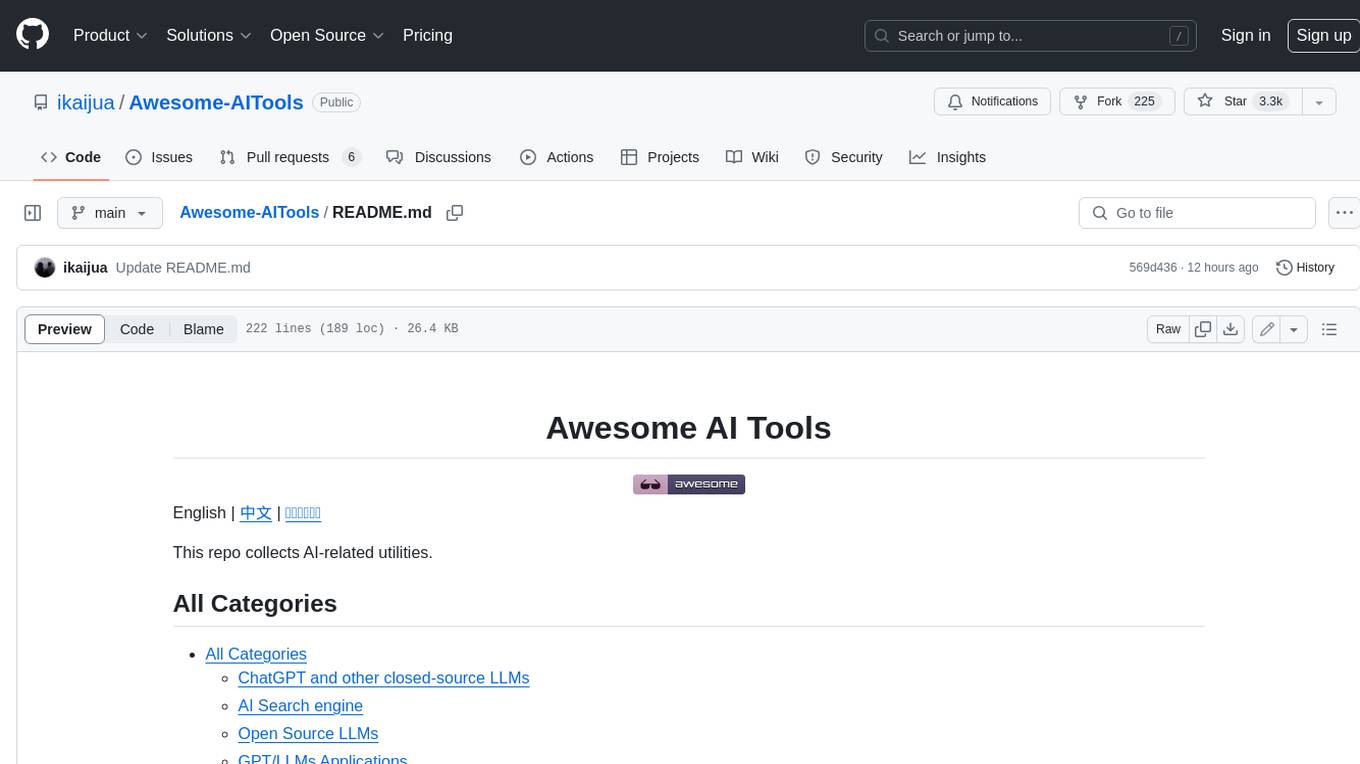
Awesome-AITools
This repo collects AI-related utilities. ## All Categories * All Categories * ChatGPT and other closed-source LLMs * AI Search engine * Open Source LLMs * GPT/LLMs Applications * LLM training platform * Applications that integrate multiple LLMs * AI Agent * Writing * Programming Development * Translation * AI Conversation or AI Voice Conversation * Image Creation * Speech Recognition * Text To Speech * Voice Processing * AI generated music or sound effects * Speech translation * Video Creation * Video Content Summary * OCR(Optical Character Recognition)
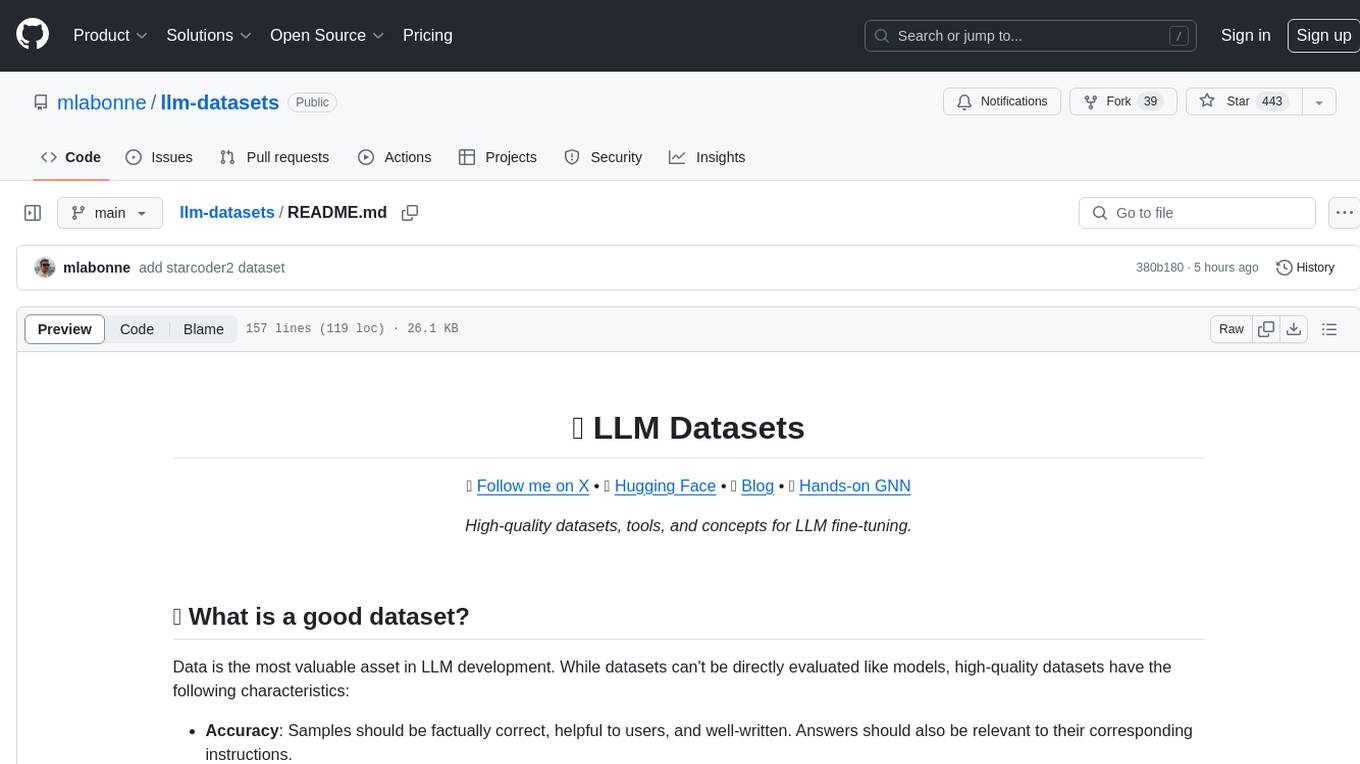
llm-datasets
LLM Datasets is a repository containing high-quality datasets, tools, and concepts for LLM fine-tuning. It provides datasets with characteristics like accuracy, diversity, and complexity to train large language models for various tasks. The repository includes datasets for general-purpose, math & logic, code, conversation & role-play, and agent & function calling domains. It also offers guidance on creating high-quality datasets through data deduplication, data quality assessment, data exploration, and data generation techniques.
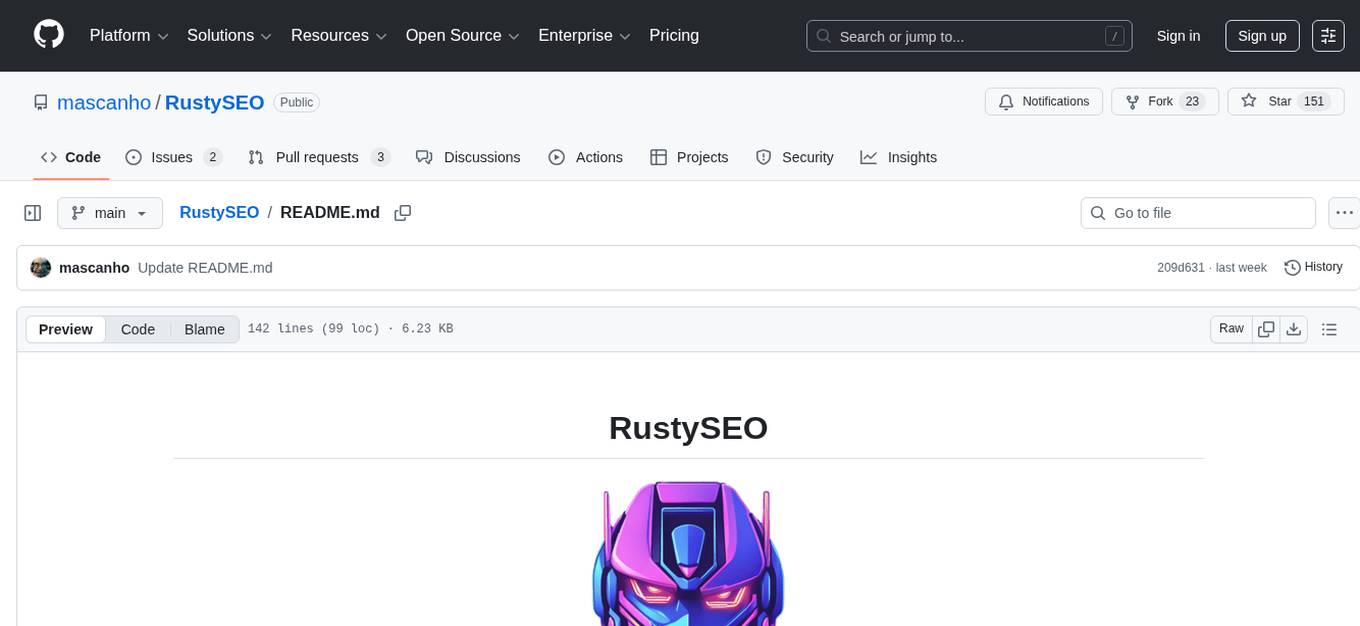
RustySEO
RustySEO is a free, modern SEO/GEO toolkit designed to help users crawl and analyze websites and server logs without crawl limits. It is an all-in-one, cross-platform marketing toolkit for comprehensive SEO & GEO analysis, providing actionable insights into marketing and SEO strategies. The tool offers features such as shallow & deep crawl, technical diagnostics, on-page SEO analysis, dashboards, reporting, topic and keyword generators, AI chatbot, crawl history, image conversion and optimization, and more. RustySEO aims to be a robust, free alternative to costly commercial SEO tools, with integrations like Google PageSpeed Insights, Google Gemini, and more.
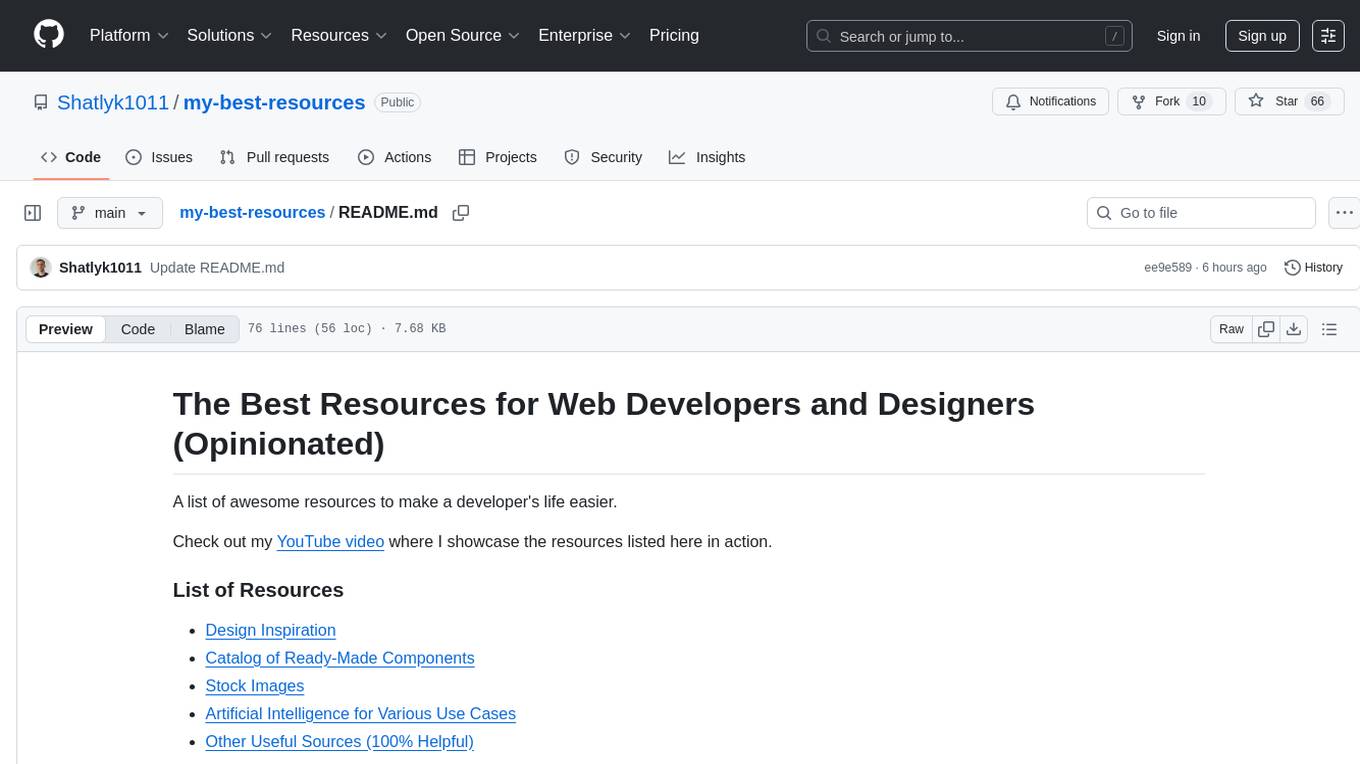
my-best-resources
my-best-resources is a curated list of resources for web developers and designers, aimed at making their lives easier. It includes sections on design inspiration, ready-made components, stock images, artificial intelligence tools for various use cases, and other useful sources. The repository provides links and descriptions for each resource, offering a valuable collection of tools and assets for web development and design projects.
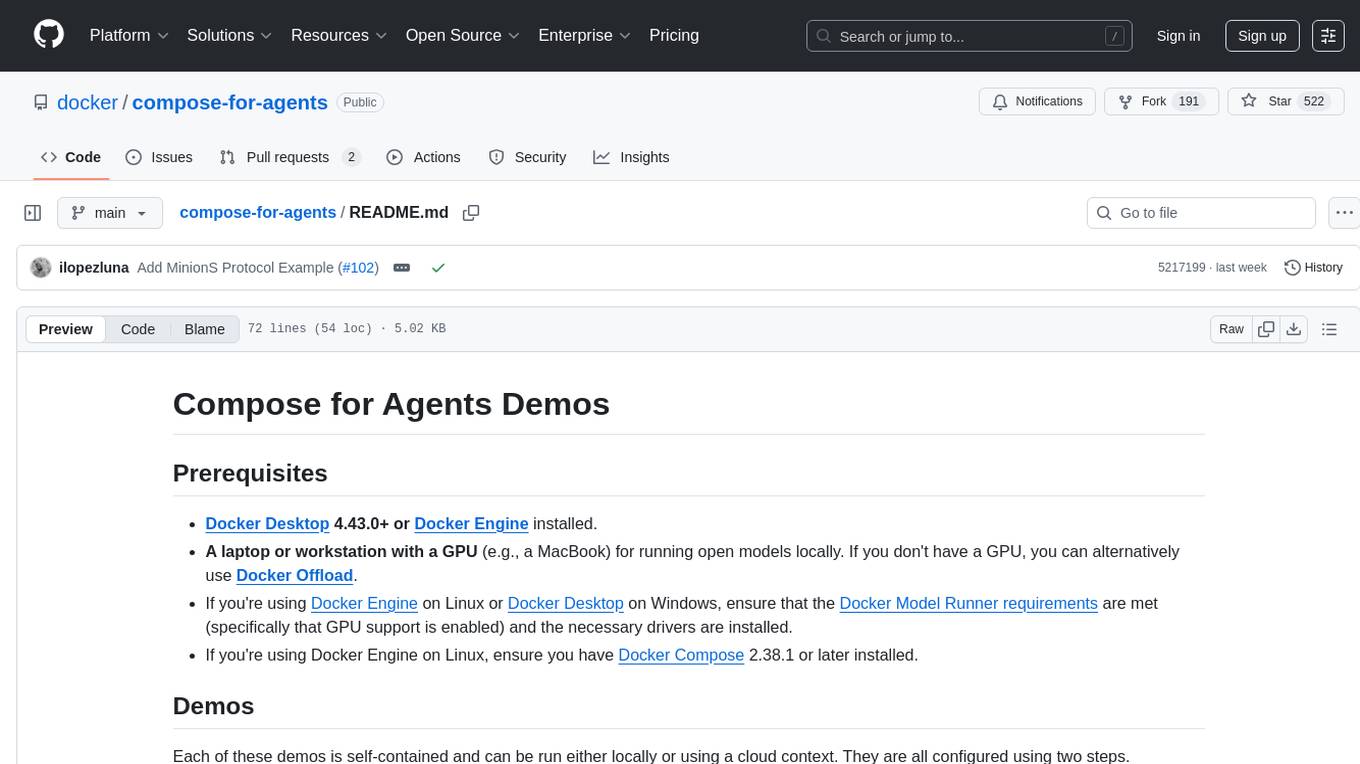
compose-for-agents
Compose for Agents is a tool that allows users to run demos using OpenAI models or locally with Docker Model Runner. The tool supports multi-agent and single-agent systems for various tasks such as fact-checking, summarizing GitHub issues, marketing strategy, SQL queries, travel planning, and more. Users can configure the demos by creating a `.mcp.env` file, supplying required tokens, and running `docker compose up --build`. Additionally, users can utilize OpenAI models by creating a `secret.openai-api-key` file and starting the project with the OpenAI configuration.
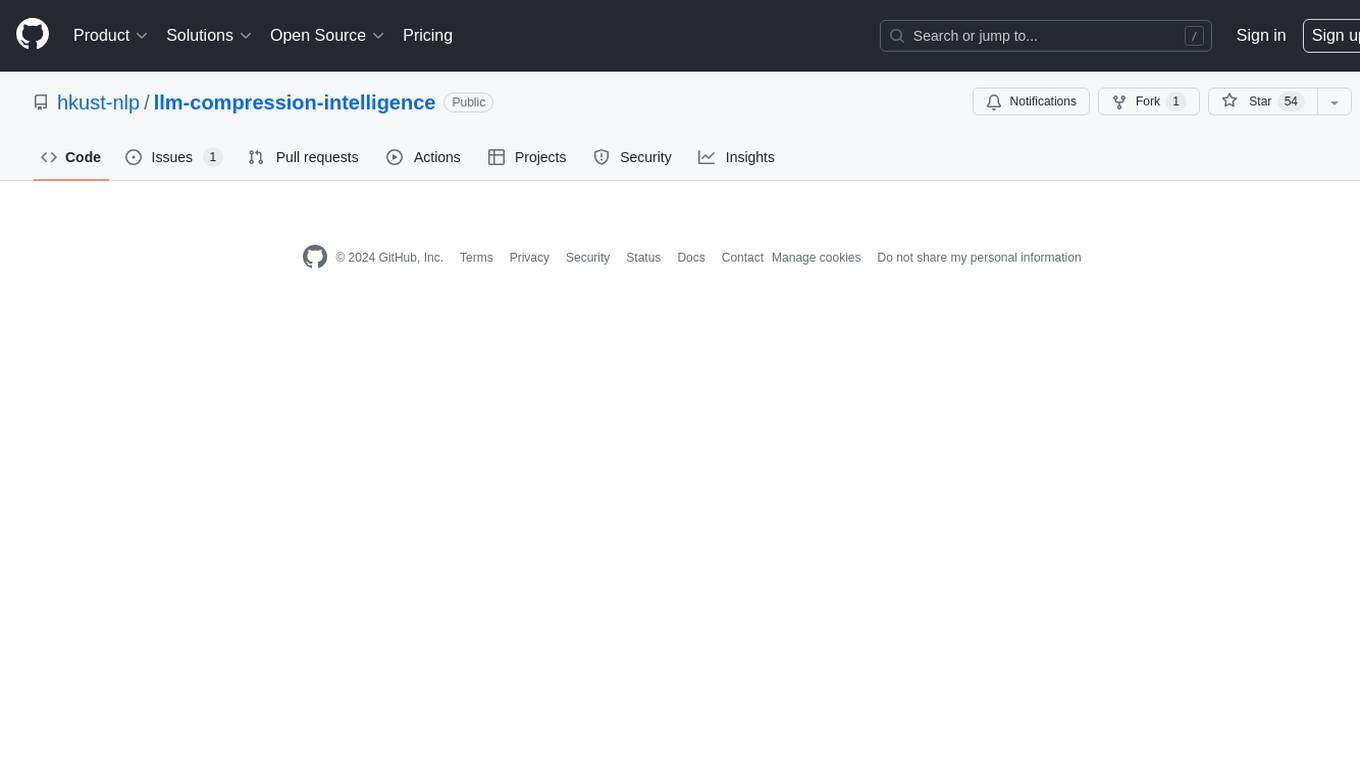
llm-compression-intelligence
This repository presents the findings of the paper "Compression Represents Intelligence Linearly". The study reveals a strong linear correlation between the intelligence of LLMs, as measured by benchmark scores, and their ability to compress external text corpora. Compression efficiency, derived from raw text corpora, serves as a reliable evaluation metric that is linearly associated with model capabilities. The repository includes the compression corpora used in the paper, code for computing compression efficiency, and data collection and processing pipelines.
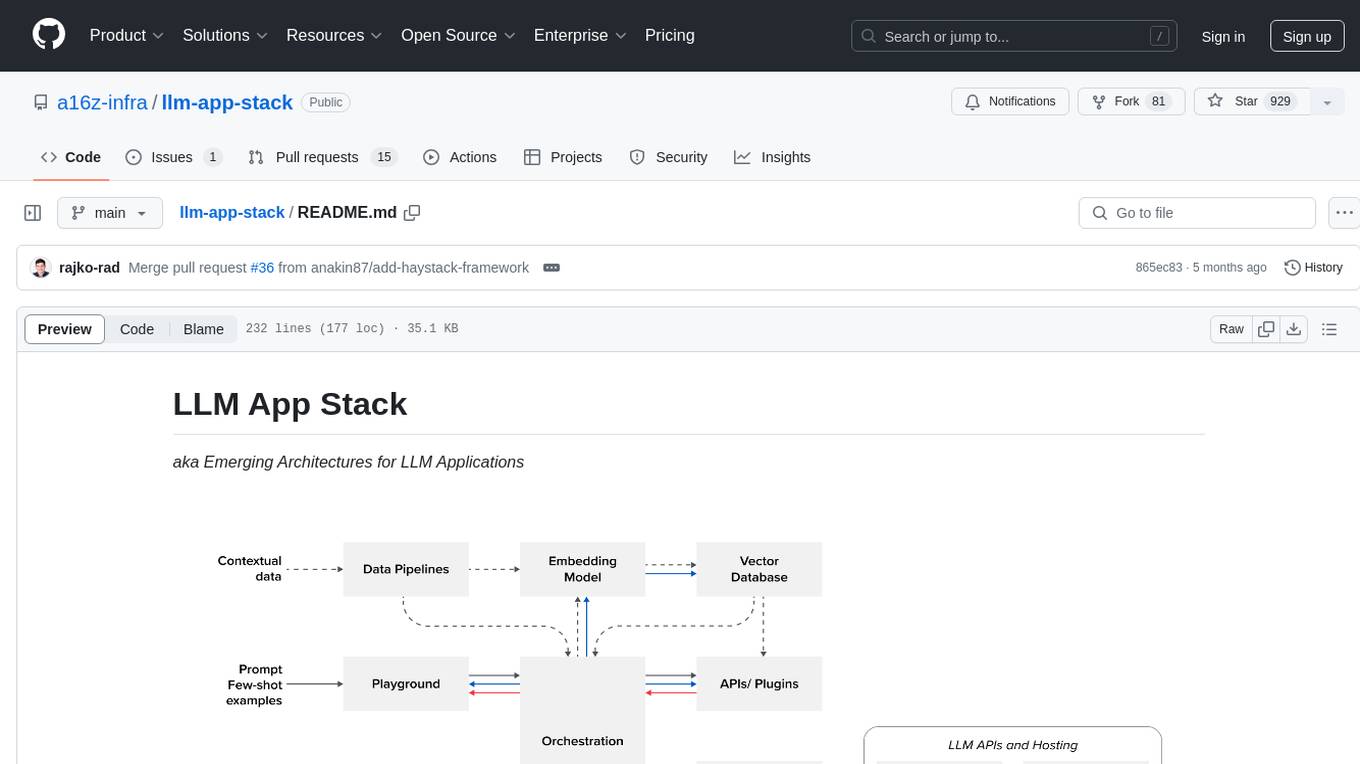
llm-app-stack
LLM App Stack, also known as Emerging Architectures for LLM Applications, is a comprehensive list of available tools, projects, and vendors at each layer of the LLM app stack. It covers various categories such as Data Pipelines, Embedding Models, Vector Databases, Playgrounds, Orchestrators, APIs/Plugins, LLM Caches, Logging/Monitoring/Eval, Validators, LLM APIs (proprietary and open source), App Hosting Platforms, Cloud Providers, and Opinionated Clouds. The repository aims to provide a detailed overview of tools and projects for building, deploying, and maintaining enterprise data solutions, AI models, and applications.
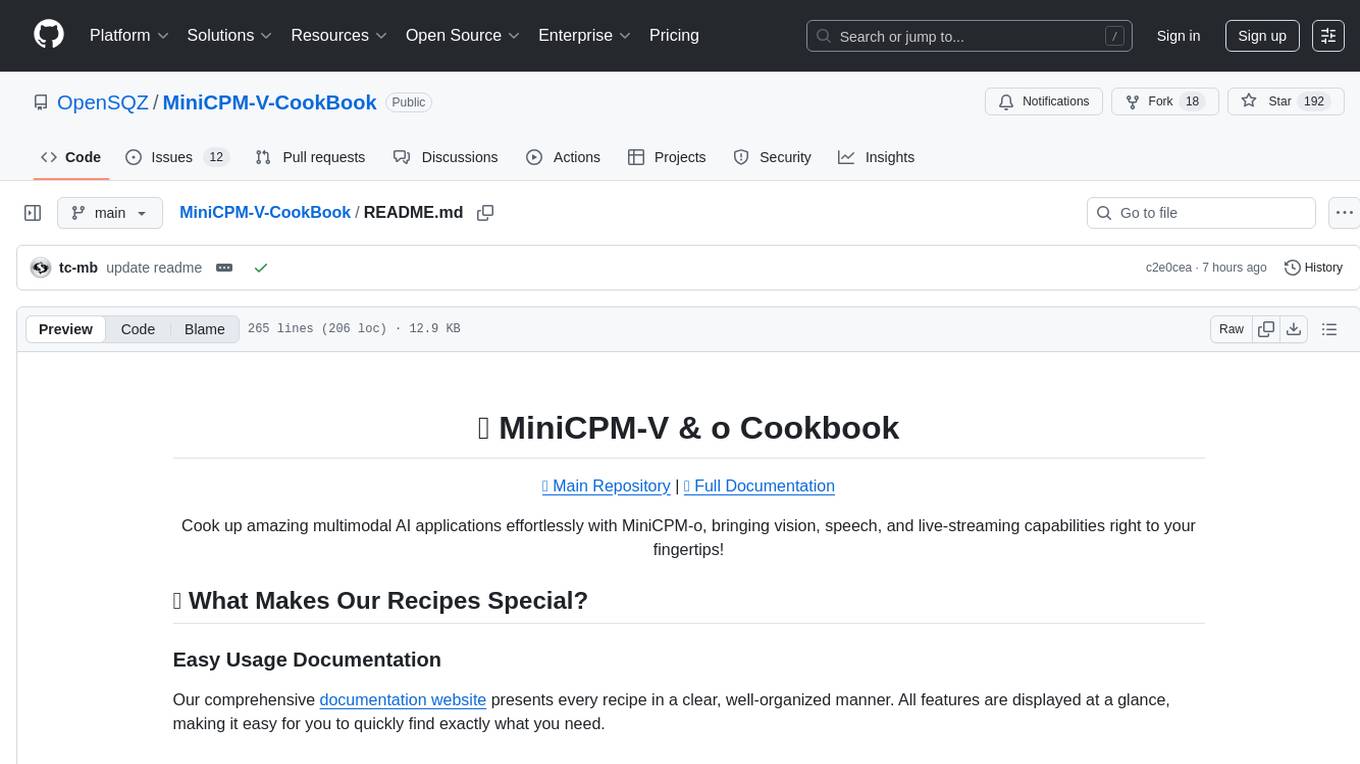
MiniCPM-V-CookBook
MiniCPM-V & o Cookbook is a comprehensive repository for building multimodal AI applications effortlessly. It provides easy-to-use documentation, supports a wide range of users, and offers versatile deployment scenarios. The repository includes live demonstrations, inference recipes for vision and audio capabilities, fine-tuning recipes, serving recipes, quantization recipes, and a framework support matrix. Users can customize models, deploy them efficiently, and compress models to improve efficiency. The repository also showcases awesome works using MiniCPM-V & o and encourages community contributions.
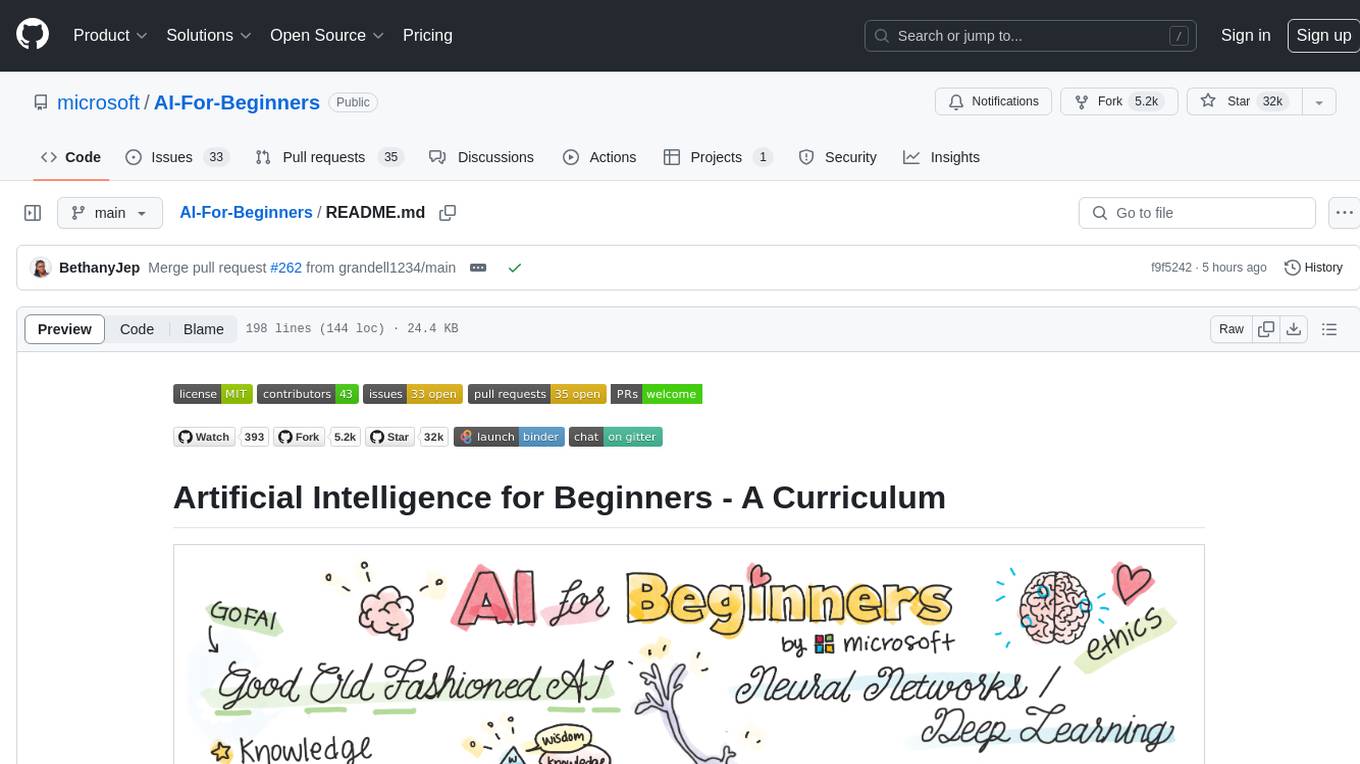
AI-For-Beginners
AI-For-Beginners is a comprehensive 12-week, 24-lesson curriculum designed by experts at Microsoft to introduce beginners to the world of Artificial Intelligence (AI). The curriculum covers various topics such as Symbolic AI, Neural Networks, Computer Vision, Natural Language Processing, Genetic Algorithms, and Multi-Agent Systems. It includes hands-on lessons, quizzes, and labs using popular frameworks like TensorFlow and PyTorch. The focus is on providing a foundational understanding of AI concepts and principles, making it an ideal starting point for individuals interested in AI.
For similar tasks

redis-ai-resources
A curated repository of code recipes, demos, and resources for basic and advanced Redis use cases in the AI ecosystem. It includes demos for ArxivChatGuru, Redis VSS, Vertex AI & Redis, Agentic RAG, ArXiv Search, and Product Search. Recipes cover topics like Getting started with RAG, Semantic Cache, Advanced RAG, and Recommendation systems. The repository also provides integrations/tools like RedisVL, AWS Bedrock, LangChain Python, LangChain JS, LlamaIndex, Semantic Kernel, RelevanceAI, and DocArray. Additional content includes blog posts, talks, reviews, and documentation related to Vector Similarity Search, AI-Powered Document Search, Vector Databases, Real-Time Product Recommendations, and more. Benchmarks compare Redis against other Vector Databases and ANN benchmarks. Documentation includes QuickStart guides, official literature for Vector Similarity Search, Redis-py client library docs, Redis Stack documentation, and Redis client list.
For similar jobs

weave
Weave is a toolkit for developing Generative AI applications, built by Weights & Biases. With Weave, you can log and debug language model inputs, outputs, and traces; build rigorous, apples-to-apples evaluations for language model use cases; and organize all the information generated across the LLM workflow, from experimentation to evaluations to production. Weave aims to bring rigor, best-practices, and composability to the inherently experimental process of developing Generative AI software, without introducing cognitive overhead.

LLMStack
LLMStack is a no-code platform for building generative AI agents, workflows, and chatbots. It allows users to connect their own data, internal tools, and GPT-powered models without any coding experience. LLMStack can be deployed to the cloud or on-premise and can be accessed via HTTP API or triggered from Slack or Discord.

VisionCraft
The VisionCraft API is a free API for using over 100 different AI models. From images to sound.

kaito
Kaito is an operator that automates the AI/ML inference model deployment in a Kubernetes cluster. It manages large model files using container images, avoids tuning deployment parameters to fit GPU hardware by providing preset configurations, auto-provisions GPU nodes based on model requirements, and hosts large model images in the public Microsoft Container Registry (MCR) if the license allows. Using Kaito, the workflow of onboarding large AI inference models in Kubernetes is largely simplified.

PyRIT
PyRIT is an open access automation framework designed to empower security professionals and ML engineers to red team foundation models and their applications. It automates AI Red Teaming tasks to allow operators to focus on more complicated and time-consuming tasks and can also identify security harms such as misuse (e.g., malware generation, jailbreaking), and privacy harms (e.g., identity theft). The goal is to allow researchers to have a baseline of how well their model and entire inference pipeline is doing against different harm categories and to be able to compare that baseline to future iterations of their model. This allows them to have empirical data on how well their model is doing today, and detect any degradation of performance based on future improvements.

tabby
Tabby is a self-hosted AI coding assistant, offering an open-source and on-premises alternative to GitHub Copilot. It boasts several key features: * Self-contained, with no need for a DBMS or cloud service. * OpenAPI interface, easy to integrate with existing infrastructure (e.g Cloud IDE). * Supports consumer-grade GPUs.

spear
SPEAR (Simulator for Photorealistic Embodied AI Research) is a powerful tool for training embodied agents. It features 300 unique virtual indoor environments with 2,566 unique rooms and 17,234 unique objects that can be manipulated individually. Each environment is designed by a professional artist and features detailed geometry, photorealistic materials, and a unique floor plan and object layout. SPEAR is implemented as Unreal Engine assets and provides an OpenAI Gym interface for interacting with the environments via Python.

Magick
Magick is a groundbreaking visual AIDE (Artificial Intelligence Development Environment) for no-code data pipelines and multimodal agents. Magick can connect to other services and comes with nodes and templates well-suited for intelligent agents, chatbots, complex reasoning systems and realistic characters.


